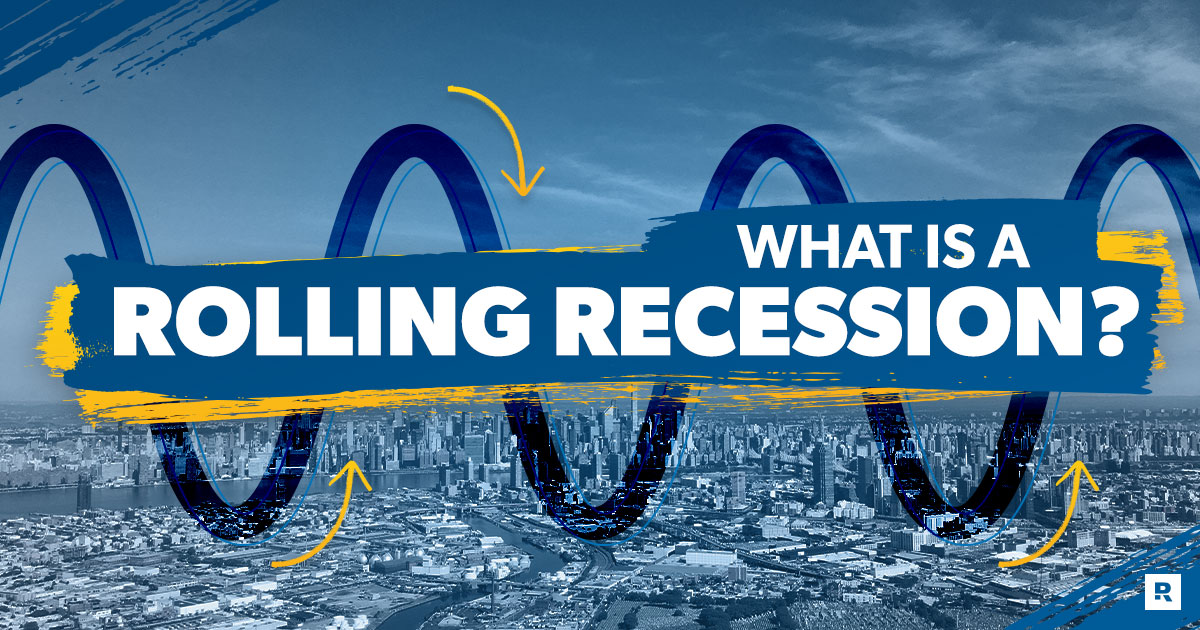A rolling recession is kind of like a rolling blackout.
It happens when parts of the economy take a downturn—but others stay positive.
Picture this: You’re flying at night over Chicago. It gleams like a distant galaxy made up of millions of stars. And then, the lights on the South Side flicker and go completely black. They flash back on, but a few seconds later, the North Side blinks out for a minute.
Just like a rolling blackout hits different areas of a city, a rolling recession hits different parts of the economy at different times. Instead of the whole economy tanking at once (like it would during a normal recession), some parts of the economy skid to a halt while others keep trucking along.
Just to be clear, a recession is when the economy goes down in the dumps for six months to a year. This usually means the stock market tanks, companies lose money (or go bankrupt), and people lose jobs.
What Causes a Rolling Recession?
Rolling recessions are often caused by a decrease in consumer spending on particular goods or services. For instance, you might skip buying a new refrigerator because more of your money is going to pay for food and gas due to inflation. If enough people do this, the manufacturing industry could start to decline.
Get expert money advice to reach your money goals faster!
But at the same time, the gas and oil industry might be booming because of higher gas prices. This strength in one area of the economy offsets a weakness in another part.
If enough people are worried about the future of their jobs or the economy and decide to save their money to prepare for difficult times (and it’s always good to be prepared), that means they’re spending less. The technical term for this is a drop in consumer confidence—and this can push certain parts of the economy into a recession.
Are We in a Rolling Recession?
Are we in a traditional recession right now? Nope. But it’s harder to tell if we’re in a rolling recession or not. Some economists think we’re currently experiencing a rolling recession, while others believe downward trends in some industries are just a sign that a full-on recession is headed our way.1
Whatever the case, though, high interest rates have pushed the real estate market into a recession because many buyers have been priced out of the market.2 The tech industry doesn’t seem to be on strong footing either (you’ve probably seen the news of big layoffs at well-known tech companies).
But the economy still has some positives going for it. The labor market is strong. And gross domestic product (GDP), which is the total value of all goods and services produced within a country, is positive. GDP growth was negative in the first two quarters of 2022, and this set off alarms that the economy was in a recession, but GDP bounced back into positive territory in the last two quarters of 2022.
Inflation has also started to come down, and the Federal Reserve has scaled back the interest rate hikes it was using to tame inflation.
Truthfully, no one knows for sure what’s going to happen with the economy—which is why you need to control what you can control. And you don’t have to be an economist with a bunch of fancy degrees to know how to prepare for a recession. It’s pretty simple.
How to Prepare for a Rolling Recession
Whether you’re preparing for a rolling recession, a traditional recession or some other yet-to-be-named type of recession, our proven plan (the 7 Baby Steps) is still the same: Live on a budget, pay off debt, save for emergencies, invest for retirement, and live and give like no one else.
After you’ve saved $1,000 for your starter emergency fund, work your debt snowball like there’s no tomorrow! Get out of debt as fast as you can. And when you aren’t spending a bunch of your money on debt payments, you’ll have a new sense of peace. You’ll also have room in your budget to save for a fully funded emergency fund of 3–6 months of expenses. That’ll definitely come in handy if you lose your job during a recession.
If you’re saving for retirement, keep at it—even when the stock market dips. The market may go down during a recession, but it has a long history of upward growth. Don’t pull your money out just because you read a scary headline. Investing for retirement is a marathon, not a sprint! What you do with your money during a recession is exactly what you should do when the economy looks fine and dandy.
Now let’s go back to the blackout analogy for a sec. When you’re prepared for a recession, you’ll feel like you have a generator and a flashlight with extra batteries while the rest of the world is fumbling around in the dark. Being out of debt and having an emergency fund will give you peace in the midst of a storm.
Learn the Proven Way to Get Out of Debt
Ready to take the next step to make sure you’re prepared for whatever the economy throws at you? Financial Peace University (FPU) is a nine-lesson course that teaches you the step-by-step plan—aka the Baby Steps—to pay off debt fast and save money for your future. Through FPU, millions of people have taken control of their money for good. And you can too!



